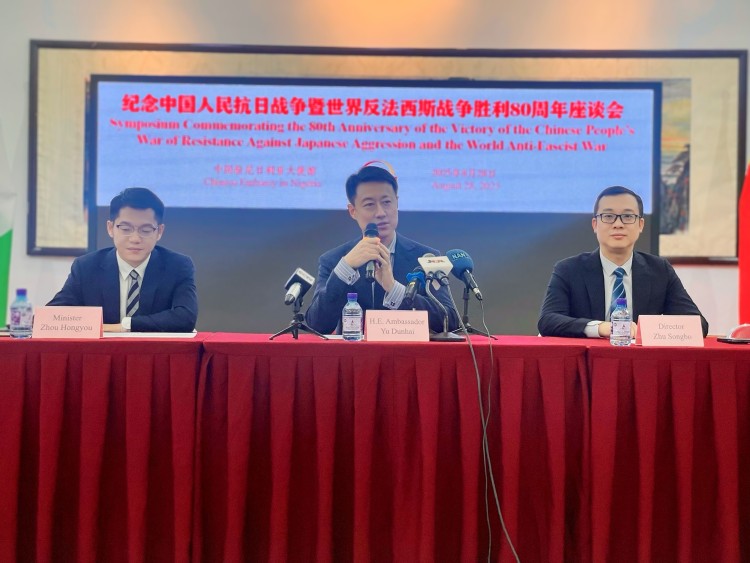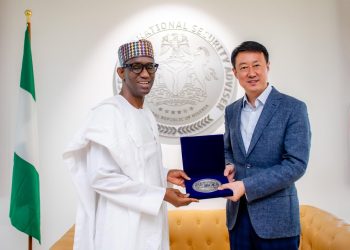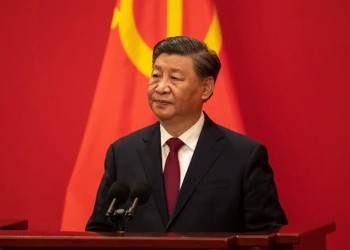The Chinese Embassy in Nigeria on Thursday commemorated the 80th anniversary of the Victory of the Chinese People’s War of Resistance Against Japanese Aggression and the World Anti-Fascist War, with a renewed call for peace, unity, and multilateral cooperation.
Speaking at a symposium in Abuja, Chinese Ambassador to Nigeria, Mr. Yu Dunhai, described the commemoration as both “a solemn reminder of shared sacrifices and a renewed pledge for peace.”
“This anniversary is not just a reflection on history but a reminder of the values of courage, unity, and perseverance. We are not here to dwell on hatred, but to honor sacrifices and pledge that such tragedies will never happen again,” Yu said.
The envoy recalled the September 18, 1931 Incident, which triggered China’s 14-year resistance against Japanese militarism, highlighting the resilience of the Chinese people and the leadership role of the Communist Party of China (CPC).
Yu also paid tribute to Nigerian soldiers who fought alongside Allied forces against Japan in Burma during the war, stressing that China and Africa share a “legacy of sacrifice in the global anti-fascist struggle.”
Reiterating China’s commitment to peaceful development, the Ambassador cited President Xi Jinping’s vision of building “a community with a shared future for mankind,” alongside global initiatives such as the Belt and Road Initiative, the Global Development Initiative, the Global Security Initiative, and the Global Civilisation Initiative.
“China will never forget how hard it was to achieve peace. That is why we remain firmly committed to peaceful development and to building partnerships that reject hegemony and promote win-win cooperation,” he said.
Yu further stressed that Taiwan’s return to China was part of the post-war international order, reaffirming Beijing’s position that reunification is “a historic inevitability.” He commended Nigeria for its consistent support of the One-China principle, describing it as a cornerstone of the growing China-Nigeria partnership.
He added that as major developing nations and key members of the Global South, China and Nigeria share a responsibility to safeguard the outcomes of World War II, defend the UN-based international order, and advance fairness and justice globally.
Providing a historical perspective, Mr. Charles Onunaiju, Director of the Centre for China Studies (CCS), highlighted the Marco Polo Bridge Incident of 1937 as the onset of Japan’s full-scale invasion. He noted that China’s resistance tied down nearly one million Japanese troops, inflicting significant losses despite immense sacrifices.
Onunaiju explained that the resilience forged during the war shaped China’s post-war political framework, citing the “Three Thirds System” as the foundation of its consultative democracy. He argued that China’s victory not only rebuilt national strength but also entrenched the philosophy of peace reflected in the Five Principles of Peaceful Coexistence.
Also speaking, Prof. Sheriff Ibrahim, Director of the Centre for Contemporary China-Africa Research and Head of the International Centre at the University of Abuja, described the war’s victory as “a lesson for humanity, a tale of hope, resilience, and patriotism.”
He outlined six key lessons: rejection of colonialism, patriotism, unity of purpose, justified political resistance against tyranny, international cooperation, and the recognition that victory is earned through resilience.
“The Chinese people’s unprecedented resistance against Japanese aggression transformed them into a paragon of patriotism and resilience. The world must learn from this example and pursue peace with unity and justice,” Ibrahim said.
The symposium featured a photo exhibition showcasing the history of the war and honouring the heroes who lost their lives in the struggle for peace.













































